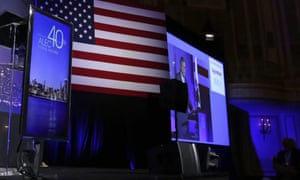The Guardian - Back to home
Revealed :
Rightwing push to ban criticism of Israel on US campuses...
Documents seen by Guardian show fresh attack on university debate under the guise of prohibiting antisemitism
Ed Pilkington in New York
Thu 17 Oct 2019
 Donald Trump and Benjamin Netanyahu in 2017. First amendment advocates see the potential spread of such laws as a major threat to free speech on campuses. Photograph: Ronen Zvulun/Reuters
Donald Trump and Benjamin Netanyahu in 2017. First amendment advocates see the potential spread of such laws as a major threat to free speech on campuses. Photograph: Ronen Zvulun/ReutersRightwing activists are attempting to spread new laws across Republican-controlled states that would ban criticism on public university campuses of Israel and its occupation of Palestinian territory.
Pro-Israel and conservative lobbyists are encouraging state lawmakers to outlaw antisemitism in public education, from kindergarten through to graduate universities. But the proposed definition of antisemitism is so wide that, in addition to standard protections against hate speech towards Jews, it would also prohibit debate about the human rights violations of the Israeli government.
First amendment advocates see the potential spread of such laws as a major threat to free speech on campuses.
Among the activities that would be prohibited by the new laws are human rights investigations focusing specifically on Israel. Also banned would be any speech “demonizing Israel by … blaming Israel for all inter-religious or political tensions” or “delegitimizing Israel by … questioning Israel’s right to exist”.
The push began at a conference in August held by the American Legislative Exchange Council, Alec, a conservative network which has a long history of propagating rightwing policies at state level through model bills. The group, dubbed a “bill mill”, has spearheaded attacks on trade unions, opposition to Obamacare, voter suppression measures and legislation blocking efforts to address the climate crisis.
The meeting at Alec is disclosed in emails obtained under a freedom of information request by David Armiak, research director for the watchdog Center for Media and Democracy (CMD) and shared with the Guardian. They show that several Republican state lawmakers joined pro-Israeli lobbyists in Austin, Texas to discuss disseminating new restrictions on speech relating to Israel on campuses across the heartlands.
The private meeting was led by Randy Fine, a Republican from Florida who was instrumental in passing in May the first state law outlawing antisemitism in public education. A week later he emailed fellow participants under the subject line: Anti-Semitism Bill Discussed at Alec.
Fine has faced controversy in the past over his aggressive opposition to public debate about Israel. Earlier this year he called a local Jewish constituent a “Judenrat” because the man had attended a forum titled: Palestine/Israel, Opening the Dialogue.
The term “Judenrat” was used in the second world war to castigate Jewish collaborators with the Nazis.
Also attending the meeting at Alec were lawmakers from South Carolina, North Carolina, Arkansas, Kansas and Oklahoma, as well as representatives of two pro-Israel lobbying groups. “It was great to see you at the Alec conference last week in Austin and to briefly share the work we did in passing HB 741, the strongest antisemitism bill ever passed in the United States,” Fine wrote to them.
The Florida Republican encouraged peers in other state assemblies to work with one of the lobbying groups, the Israeli-American Coalition for Action, which he said had been “instrumental in providing outside support as I pushed the bill”. In a separate email to the group, IAC for Action’s Joseph Sabag said that he and his legal team had taken Fine’s Florida bill and “refined it into a model that can be brought elsewhere. I urge you to contact me or Rep Alan Clemmons and take advantage of our policy support if you are considering filing a bill.”
Clemmons is Alec’s national chairman. A Republican representative from South Carolina, he introduced a similar antisemitism definition into a budget bill in his state in 2018.
Sabag told the Guardian that it would be incorrect to suggest that IAC for Action was encouraging state lawmakers to adopt the definition. He said his organization “provides legal analysis and policy resources in response to requests from legislators who wish to draw upon our subject matter expertise. Antisemitism is a hot issue right now, so of course there are many who are naturally interested.”
He also denied that Alec was involved in the legislative push. “No such bills have been presented to them for model consideration, and they’ve held no policy discussions on the matter or taken any position.”
The emails seen by the Guardian, he said, “emerged out of an after-hours private gathering of friends and colleagues, not an Alec function and Alec held no such forum or discussion at its conference”.
The Guardian asked Alec to comment, but received no reply.
The emails give a clear indication of the motive behind the push for antisemitism bills – countering criticism of Israel on campuses.
Fine writes that under the new laws “antisemitism (whether acts by students, administrators or faculty, policies and procedures, club organizations etc) [will] be treated identically as how racism is treated. Students for Justice in Palestine is now treated the same way as the Ku Klux Klan – as they should be.”
Students for Justice in Palestine (SJP) is a leading pro-Palestinian student activist group that campaigns in at least 80 campuses for an international boycott of Israel in protest at its occupation of the West Bank and Gaza. It has been at the forefront of the boycott, divestment and sanctions (BDS) movement in the US that has already prompted a number of states to pass new laws penalizing such boycotts of Israel to the dismay of free speech advocates.
Sabag was asked by the Guardian about the comparison drawn by Fine between SJP and the violent white supremacist group the KKK. He said: “SJP is one of America’s most prominent anti-Israel propaganda groups and has material connections to organizations designated by the US Justice Department as terrorism co-conspirators. In the course of promoting BDS, or national-origin based discrimination against Israel, SJP members typically employ classic antisemitic themes and blood libels.”
He added: “They also employ gross misrepresentations of Zionism, Israel’s Jewish national character and government policies. This messaging strategy aims to facilitate the development of anti-Israel and anti-Jewish perspectives among unsuspecting and unknowledgeable audiences.”
Raphael Eissa, a National SJP Steering Committee member, dismissed Sabag’s depiction. He said that SJP was a “an independent grassroots network of everyday students and recent alum” that regularly endures “coordinated fear mongering campaigns and racist PR tactics”.
The Guardian spoke to a student member of SJP at University of California, Berkeley who insisted on anonymity because of the harassment she had experienced on campus. Last November she was one of the SJP organizers of a vigil to mourn jointly the 11 Jewish victims of the mass shooting at the Tree of Life synagogue in – the deadliest attack against Jews in America – and three Palestinian children who were killed that same October weekend from an Israeli airstrike.
“We wanted to make a statement about solidarity between our two communities, that we were all in mourning,” said the student, describing herself as an anti-Zionist Jew from a strongly Zionist family background.
After SJP advertised the vigil on its Facebook page, the student said she came under a barrage of attacks on social media accusing her of being antisemitic. She said she found the charge upsetting and ironic.
“As a Jewish student, I deeply care about antisemitism because it affects me and my family personally, and because it informs my concern about oppression of Jews and Palestinians and all people – it’s why I do what I do.”
In the face of such opprobrium, the Berkeley branch of SJP cancelled the public vigil and held it privately off-campus.
The push for new state laws comes at a time of increasing antisemitic attacks in the US and around the world. The latest FBI figures for 2017 recorded a 37% increase on the previous year in antisemitic hate crimes in the US, up to 938 incidents. Other databases put the figure substantially higher.
In the context of this rising violence, much of the text of the Florida antisemitism bill is non-contentious. It outlaws a number of anti-Jewish tropes such as “accusing Jews as a people of inventing or exaggerating the Holocaust”.
But critics say such uncontroversial material sits alongside clauses in the bill that would censor debate on Israeli government action.
Liz Jackson, a staff attorney with Palestine Legal that represents campaigners for Palestinian rights in the US who is herself Jewish, said: “It’s riding off the universally agreed idea that antisemitism is bad and must be stopped at a time of a frightening resurgence in white supremacist violence. It’s extremely cynical to masquerade as fighting antisemitism when you are, in fact, shutting down criticism of Israel.”
The clauses relating to Israel in the definition of antisemitism now being disseminated to several states emanates from a 2005 text from the European Monitoring Centre on Racism and Xenophobia (EUMC). Ken Stern, director of the Bard Center for the Study of Hate who was a lead drafter of the EUMC text, said it was intended to facilitate reporting of antisemitic attacks across Europe.
“It was never intended to suppress discussion of ideas on campuses.”
Stern said that attempts to silence opposition was happening on both sides of the Israel-Palestinian divide on US campuses. “It’s a battlefield right now.”
But, he added, he was concerned “about the attempt to curtail free speech among students – the whole idea is to encourage them to wrestle with new ideas, particularly those they find disturbing”.
Sabag dismissed first amendment fears about the new antisemitism bills. “To suggest that such laws violate first amendment rights is an outright falsehood that serves the purposes of anti-Israel and antisemitic forces. The Florida law addresses criminal and discriminatory conduct that is not protected by the first amendment, and it includes explicit provisions that the law is not to be construed in any way that would violate free speech.”


Geen opmerkingen:
Een reactie posten
Opmerking: Alleen leden van deze blog kunnen een reactie posten.